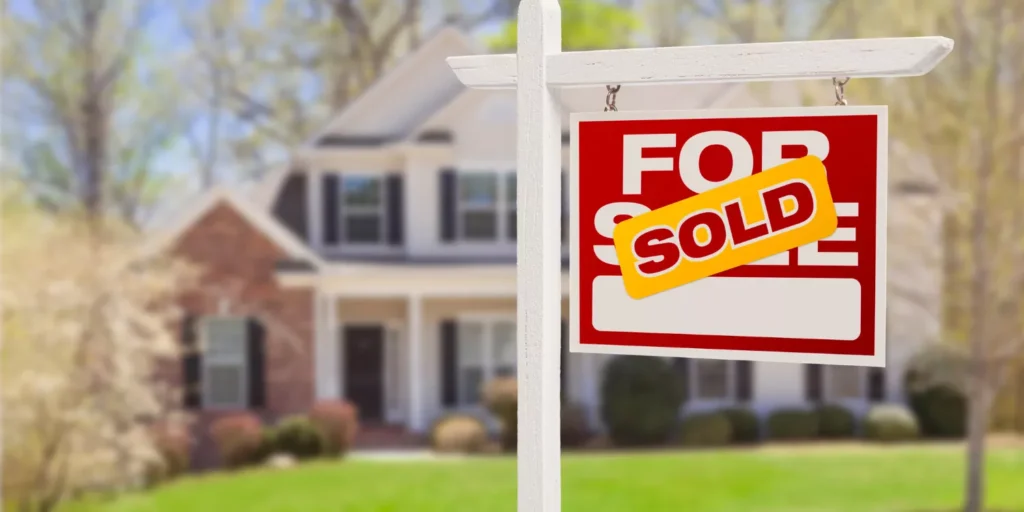Selling your house can be an overwhelming task. A key towards success is establishing the right price. This blog will shed light on accurate pricing strategies, tools, as well as effective tips to prepare your house for sale. Let us get started and find out the answer to the question of how to properly price your home:
How to Properly Price Your Home: The Vitality of Precise Home Pricing for Selling Your Home
Accurately pricing your home creates the stage for a successful home sale. Pricing it right captivates buyers. Moreover, it can also prevent the listed property from lingering around the market for a longer period. On the other hand, overvaluing the property may decrease its chances of getting sold, whereas pricing it too low could lead to financial losses or providing the impression that there is an issue with the house, thereby reducing the home’s value.
Depending on an experienced real estate professional plays a major role in achieving the sweet spot in terms of pricing a house. They bring in top-tier expertise related to the current conditions of the housing market, comparative sales, as well as other important factors which can influence the value of your home.
Aligning the list price of the house as per their recommendations and suggestions increases the chances of maximizing returns on investments as well as achieving financial targets within any market scenario.
The Right Tools for Determining the Value of Your House
Automated Valuation Models
Automated Valuation Models, also referred to as AVMs, offer quick and accurate estimates in terms of prices of homes on the market. Zillow’s Zestimate is the perfect example of an efficient AVM. Online home value estimators like these acquire these figures by performing thorough analysis on data related to bedrooms, bathrooms, a property’s size, as well as the area’s most recent comparable sales.
Sellers find AVMs to be highly effective tools for acquiring an initial estimate of how much their home is worth. However, it is important to note that these models also come with certain limitations. An AVM prediction’s accuracy in terms of the price of a home might vary since it may not always account for each detail related to a house’s condition or its unique features.
Comparative Market Analysis (CMA) Created by Real Estate Agents
Realtors and listing agents use CMA or Comparative Market Analysis to provide in-depth insights into the values of homes present within a certain area. By comparing your house to comparable homes which have recently been sold, are currently sitting on the market, or were removed from the market due to being unsold, they can precisely pinpoint a listing cost which is competitive.
Such analysis considers upgrades, special features, etc. Moreover, they also suggest different pricing tactics like slight underpricing in order to begin bidding wars in active markets. With the help of this tool, one is better positioned to get hold of serious offers within a short period of time.
Professional Home Appraisals
Professional home appraisals provide homeowners a robust way to figure out their home value. An experienced appraiser conducts them by examining similar homes’ recent sales, evaluating the location, and performing an in-depth walkthrough of the property.
This comprehensive analysis makes sure that sellers completely understand what their house is actually worth within the current market. Appraisers bring highly-valuable expertise to the procedure. They draw on certain data such as CMA as well as local real estate trends’ knowledge in order to offer reliable valuations.
Factors to Consider Which Influence A House’s List Price

Location
The location of the property plays a major role in establishing its price. Properties located in highly sought-after areas or ones featuring breathtaking views often feature high price tags because of higher demand.
Close proximity to necessary amenities such as schools, parks, malls, etc., also influence the value of properties. On the other hand, properties present in areas which do not feature such amenities nearby feature lower price tags.
Sale Prices of Recently-Sold Similar Properties
Another vital factor is going through the recent sale market values of recently sold homes with similar features. Real estate agents and appraisers depend on this particular data to perform CMA, which has a significant impact on the list price of homes.
The comparisons help determine the amount of money on the table that potential buyers are willing to offer for purchasing properties similar to theirs. By going through the acquired numbers thoroughly, home sellers can establish realistic price tags which attract interested individuals.
The House Conditions of the Seller
The condition of a property is another factor that plays a crucial role in determining its value on the market. Homes which have been properly maintained or recently upgraded, in most cases, sell for a higher price as compared to those which have not undergone any renovations. Most buyers usually search for properties which do not need immediate renovations. This makes turnkey houses more appealing, thereby allowing them to feature hefty price tags.
To sell a home quickly and efficiently, sellers must assess the current state of their property before officially listing it for sale on the market. Recognizing areas which require repair or could potentially benefit from any upgrade that can really enhance its price can have a positive impact on the property’s final sale price.
House Improvements & Updates
Improvements as well as updates in a house can massively influence its value. Upgrading the property’s bathroom, kitchen, etc., usually leads to elevated sale prices. Smart upgrades and renovations such as these truly appeal to the interested buyers and might establish your house as the best option in a highly-competitive market. It is really important to document all the said upgrades for appraisals as well as listings.
Your Area’s Current Market Conditions
It is vital to comprehend how the conditions of the current housing market play a role. The local property market’s nature (seller’s, buyer’s, or neutral market) can truly influence your home’s pricing strategy.
For example, within a seller’s market, where the demand exceeds the supply, you may put a higher price tag on your home because of high competition amongst buyers. Conversely, due to more available listings as compared to potential buyers within a buyer’s market, setting the price of your home to recent similar home sales might be the most effective way to proceed.
Analyzing different factors to help lock in on the final price, like inventory levels, is important to assess the housing finance sector’s health in your current area. Low inventory indicates a seller’s market, wherein houses can feature elevated price per square foot or square footage.
Common Pitfalls to Avoid While Pricing Your House
Overpricing
Setting your home’s price too high might scare off interested buyers, especially the ones who search for properties online within set price bands. Most individuals looking for properties nowadays utilize virtual tools as well as filters to get hold of the right homes, i.e., the ones which meet all of their requirements, including their financial criteria.
Overpricing or a house which is overprice means that your house listing may not even appear when house hunters are searching for properties, thereby resulting in you missing out on offers from a massive pool of interested buyers. This tactic usually leads to longer DOM (days on the market) for your property.
Emotional Attachment
Emotional attachment to your home comes with its own set of challenges when it comes to establishing its price for sale. The majority of owners often form deep connections with the house they reside in, mainly due to the memories they have created as well as the personal touches they have added to it, which feel invaluable.
Sadly, this emotional value does not, in any way, translate into the values of the hot market of real estate. Emotional attachment might cloud owners’ judgment and lead them to fix prices at a much higher value than what interested buyers are ready to pay.
Hence, acknowledgement of personal bias is important for any seller who aims to achieve a successful sale of their home. They must recognize how interested buyers do not have the same emotional attachment to their property.
Upgrading Too Close to the Date of the Sale

Opting to remodel your house shortly before you put it up for sale on the housing market can spoil your hopes of a smooth and seamless house sale. Immediate renovations usually do not offer enough time for recouping the invested amount via a higher listed sale price.
In fact, they might lead potential buyers to become suspicious of last-minute changes, i.e., how they may be an attempt to cover up more serious issues. Moreover, the suspicions may push them away or compel them to negotiate more seriously for lower prices, thereby affecting your target of selling your house successfully.
Advantages of Correctly Pricing Your Home for Buyers
Establishing the right price when it comes to selling your house can truly enhance its chances of getting sold faster and for more money. Setting the right price tag attracts individuals who are seriously considering buying a new house. Moreover, it may even lead to a heated bidding war, resulting in numerous offers which go above the asking price.
This strategy makes sure that your house listing stays competitive as well as appealing in the housing market. Proper pricing also highlights a proper understanding of the current conditions of the real estate market, like seasonal demand, median selling prices, etc. As mentioned earlier, it is important to leverage tools such as CMA to precisely gauge how much your house is worth.
The Role Comparable Listings Play In Pricing Your Home for Sale
Comparable listings have a major role when it comes to setting the correct price of your house. They offer concrete data related to how similar properties in the same area are valued, thereby guiding individuals to setting a competitive listing price.
Sold Comps
Sold comps facilitate realtors from a CMA, providing deeper insights related to what interested buyers might be willing to pay.
- Understanding What Sold Comps Are: Sold comps are records of houses which are similar to houses of the individuals which have been recently sold in the same area. They offer a benchmark for properly pricing your home to sell. Real estate agents thoroughly examine these sales in order to gauge the sentiment of the current market and lock in on a robust and competitive listing price.
- Analyzing Upgrades & Unique Features: Not all houses are similar. Realtors consider factors like any upgrades or distinctive features your house possesses.
- Creating Competitive CMAs: A CMA features more than merely listing prices; it is an art which merges data with knowledge related to local markets. The agent goes through sold comps, and then factors in your house’s unique aspects to suggest a selling price which is realistic.
- Underpricing Strategy: In specific markets, establishing a lower asking cost may prove to be a smart strategic move. This method might attract a higher number of buyers as well as start a bidding war, thereby ultimately obtaining a higher sale price as compared to the initial expectation.
Each of the aforementioned steps makes sure that your house enters the housing market at a cost which attracts potential buyers while targeting to enhance your profit margin.
Expired & Withdrawn Listings
Withdrawn as well as expired listings, for sellers, act as cautionary tales, shedding light on the vitality of pricing a home properly. Such listings can offer valuable insights related to the housing market’s reception of different price points.
- Analyze both withdrawn as well as expired listings in order to gauge what potential buyers consider to be too expensive.
- Utilize the information to establish a competitive price which attracts a higher amount of potential buyers.
- Identify patterns in such listings, including price ranges which often fail to sell.
- Compare the features of your house against the ones of those in failed listings in order to avoid making similar pricing mistakes.
- Consider withdrawn or expired listings’ timing and formulate your tactics accordingly.
- Learn from the obtained feedback as well as the comments given by realtors and buyers on said listings.
- Re-evaluate the value of your house if it has the same characteristics of houses which did not get sold successfully.
- In order to understand the dynamics of the market in a better way, assess how the houses managed to remain in the market before they were withdrawn or expired.
- Factor in all the changes made to the homes after getting listed, but prior to when they were withdrawn or expired, like price drops, upgrades, etc.
- Keep in mind that successful pricing tactics evolve from the complete understanding of both successful as well as unsuccessful sales within your area.
Pending Sales
It is important to also keep in consideration the sales of similar homes which are pending within your pricing game plan or strategy. These are houses which interested buyers have made serious offers towards, and the sellers of the property have accepted, but official transactions have not yet happened. Analyzing pending sales offer insights regarding what potential house buyers are currently ready to pay for other similar properties present within the same area.
Active Listings
Active listings also play a vital role in terms of setting the correct price for your home. They provide a snapshot of the current housing market, highlighting what potential buyers may be ready to pay for properties with similar features and attributes.
Going through active listings facilitates you to understand the current market’s trends and aid you in adjusting your house’s list price accordingly. This tactic makes sure that your house stands out from the rest of the competition without being both undervalued as well as overpriced.
The Impact that Market-Dependent Pricing Has
Market-dependent pricing highly influences the speed at which a house gets sold as well as the offers it gets. The homes which are priced correctly, in line with the market’s ongoing trends, often tend to accumulate more interest from potential buyers looking to get hold of deals which match perfectly with their budget as well as needs.
The method facilitates sellers to avoid the overpricing trap, which can lead to a house getting languished in the market. Moreover, it also helps in avoiding the underpricing trap, where individuals may miss out on getting the right deal and earning what their house is actually worth. Sellers are advised to remain actively informed regarding market shifts to establish competitive prices which appeal to individuals who are seriously looking to purchase houses.
The Cruciality of Being Open to Adjusting the Price

Making adjustments to the initial selling price as per online search ranges, house sellers must identify the importance of being flexible when it comes to their strategy of home pricing. Flexibility can lead to making a major difference in the highly-competitive housing market.
Studies suggest that approximately 54% sellers had to take down the prices of their homes at least once, highlighting the crucial role that making adjustments play when it comes to making a sale. This openness to making changes when required can truly align the asking price of the house with the expectations of the buyers as well as the market’s dynamics.
The adjustments’ timing must also reflect a complete understanding of the inventory levels, average DOM, as well as the behavior of buyers. Dropping the price or price cuts in home prices act as powerful tools not merely for the correction of overpricing but also for the renewal of interest amongst potential buyers who may have ignored or overlooked your house’s listing initially.
Final Thoughts
Besides deciding on the right time to sell, properly establishing the price of your house sets the stage for successfully seeing your home get sold. It combines the market’s trends with the unique features of your property to captivate buyers who are ready to make offers.
If you are wondering “how to sell my house” and wish to set the right price for it, you are advised to get in touch with an experienced realtor to get the job done seamlessly, since selling a home is a big deal. They have ample experience to leverage tools such as AVMs, CMA, etc. Moreover, they have the knowledge required to sell quickly with ease and finesse.




